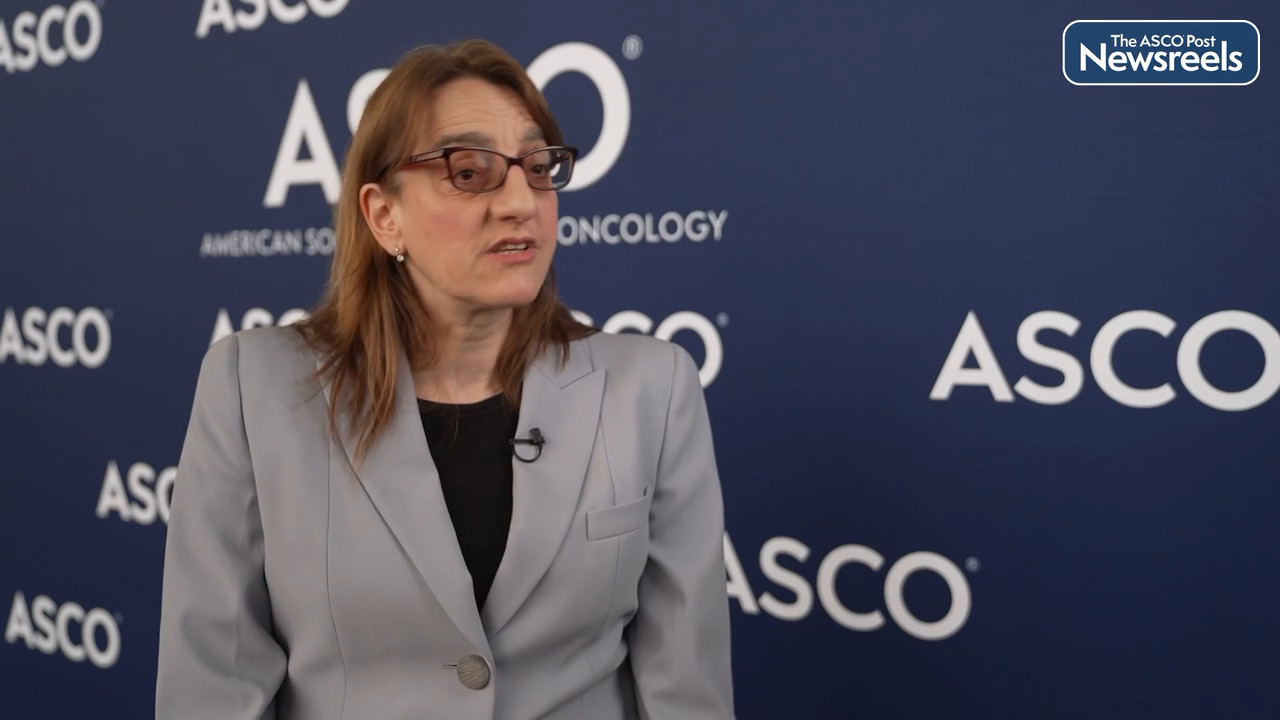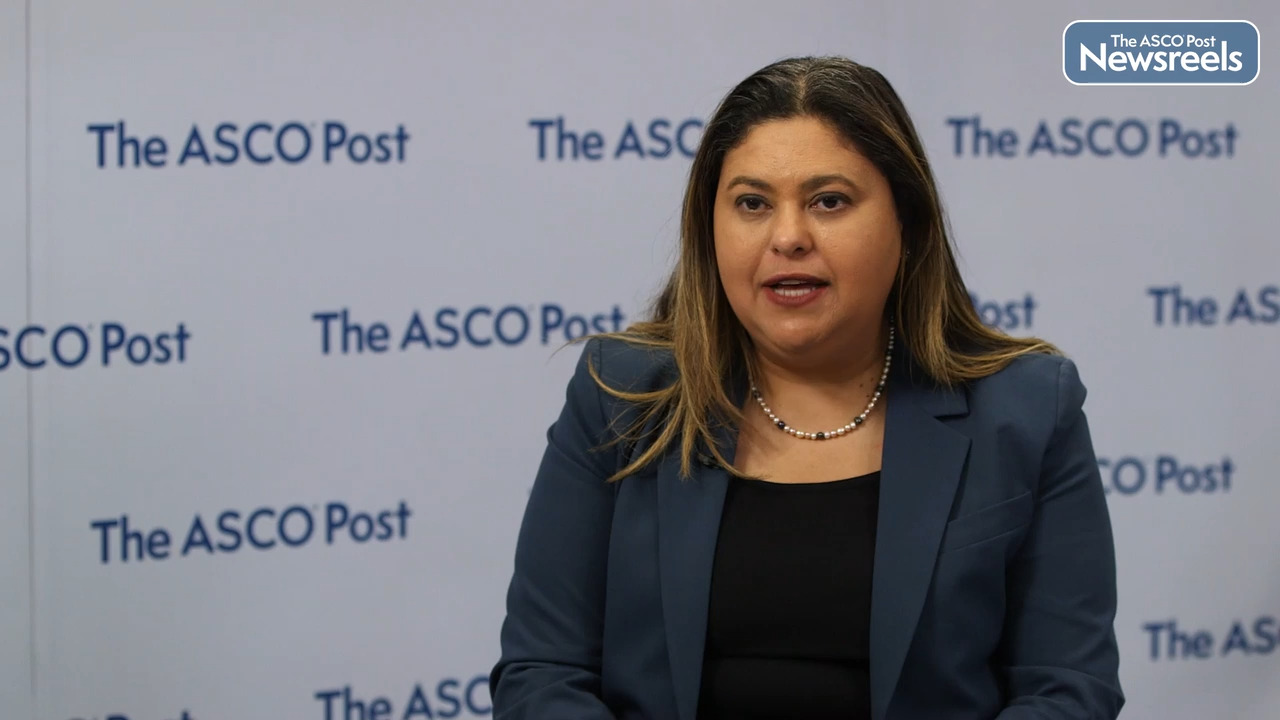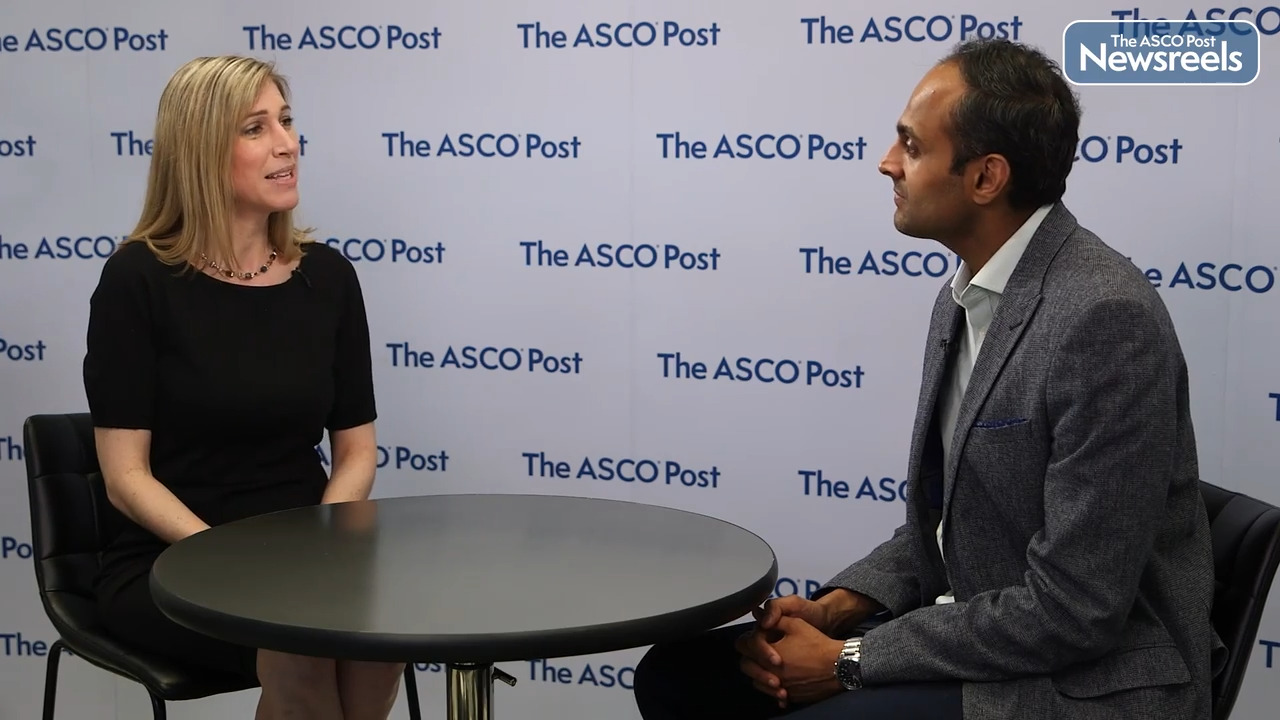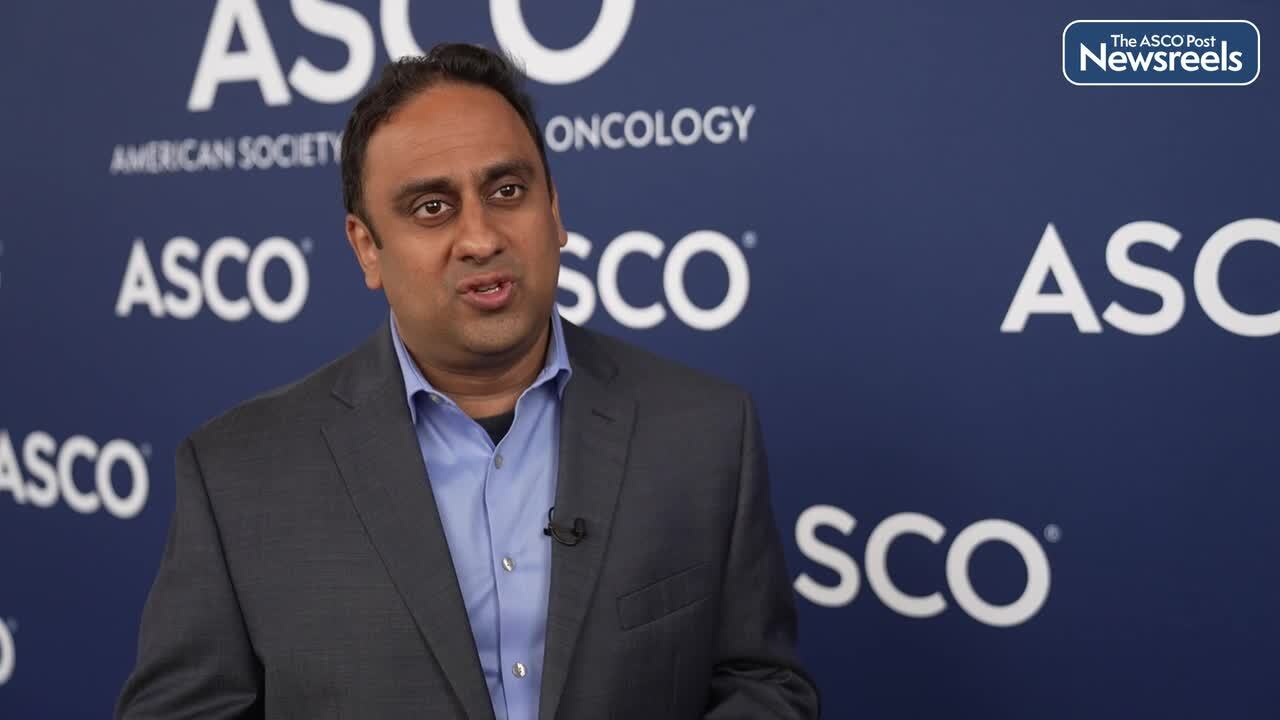Muhit Özcan, MD, on DLBCL: Early Results on Zilovertamab Vedotin
2023 ASCO Annual Meeting
Muhit Özcan, MD, of Turkey’s Ankara University School of Medicine, discusses phase II findings from the waveLINE-004 study. It showed that the antibody-drug conjugate zilovertamab vedotin had clinically meaningful antitumor activity in patients with relapsed or refractory diffuse large B-cell lymphoma (DLBCL) who experienced disease progression after, or have been ineligible for, autologous stem cell transplantation and/or chimeric antigen receptor T-cell therapy (Abstract 7531).
Transcript
Disclaimer: This video transcript has not been proofread or edited and may contain errors.
Muhit Özcan, MD:
Treatment options are limited for patients with relapsed or refractory diffuse large B-cell lymphoma who are ineligible for or who have disease progression after autologous stem cell transplant and CAR T-cell therapy. ROR1 is an oncofetal transmembrane protein that's expressed in various hematological malignancies, including diffuse large B-cell lymphomas. Zilovertamab vedotin is an antibody drug conjugate compressing an anti-ROR1 monoclonal antibody plus a cleavable linker and the anti-microtubule cytotoxin monomethyl auristatin E.
Here, we present early results from the single-arm, open label, phase-II waveLINE-004 study, which is designed to evaluate the efficacy and safe zilovertamab vedotin in patients with relapsed or refractory diffused large B-cell lymphoma who are ineligible for or who have disease progression after autologous stem cell transplant or after CAR T-cell therapy.
Patients in waveLINE-004 received zilovertamab vedotin at 2.5 milligram per kilogram intravenously every three weeks. The primary endpoint was objective response rate, and the secondary endpoint was safety and tolerability. Safety was evaluated in all patients who received at least one cycle of study treatment, and efficacy was evaluated in all patients who received at least one dose of study treatment and had at least three months of follow-up.
At the data cut-off, 40 patients had received treatment. The median age of patients was 68 years, 60% of patients had received three or more prior lines of therapy, 25% of patients had undergone prior stem cell transplant, and 28% of them had undergone prior CAR T-cell therapy. The objective response rate among the 20 patients with at least three months follow up was 30%, with two patients achieving a complete response and four patients achieving a partial response. An additional five patients had stable disease for a disease control rate of 55%, 95% confidence interval, 31.5 to 76.9%. Five patients had progressive disease and four patients could not be assessed.
When change in target lesion size was evaluated, 13 or 20 patients had any reduction from baseline, and seven patients had a reduction in target lesion size of 50% or more. Treatment-related adverse events of any grade occurred in 70% of patients, most commonly diarrhea in 23, anemia in 20, neutropenia in 18, and neutrophil count decrease in 18% of patients. Grade 3 or 4 treatment-related adverse events occurred in 40% of patients and no that's due to treatment-related adverse events occurred. One patient discontinued treatment because of grade 3 treatment-related ketoacidosis. Treatment-related peripheral neuropathy occurred in 15% of patients over grade 1 or 2. No infusion-related reactions or treatment-related tumor lysis syndrome occurred.
In summary, these earlier results from waveLINE-004 showed that zilovertamab vedotin had clinically-meaningful antitumor activity and manageable safety in patients with relapsed or refractory diffused large B-cell lymphoma who are ineligible for or who have had disease progression after autologous stem cell transplantation or after CAR T-cell therapy. These results support the continued investigation of zilovertamab vedotin in patients with relapsed or refractory diffused large B-cell lymphoma.
Related Videos
The ASCO Post Staff
Funda Meric-Bernstam, MD, of The University of Texas MD Anderson Cancer Center, discusses interim results from the DESTINY-PanTumor02 trial, the first tumor-agnostic global study of fam-trastuzumab deruxtecan-nxki (T-DXd) in a broad range of HER2-expressing solid tumors. This agent showed an encouraging overall response rate, particularly in patients with IHC 3+ expression; durable clinical benefit; and a manageable safety profile in these heavily pretreated patients. T-DXd may be a potential new treatment option for this population (Abstract LBA3000).
The ASCO Post Staff
Nagla Abdel Karim, MD, of the Inova Schar Cancer Institute, University of Virginia, discusses phase II data showing that maintenance atezolizumab plus talazoparib improved progression-free survival in Schlafen-11–selected patients with extensive-stage small cell lung cancer. This study demonstrated the feasibility of conducting biomarker-selected trials in this disease, paving the way for future evaluation of novel therapies in selected populations (Abstract 8504).
The ASCO Post Staff
Alicia K. Morgans, MD, MPH, and Praful Ravi, MRCP, MBBChir, both of Dana-Farber Cancer Institute, discuss an individual patient-data analysis of randomized trials from the ICECAP collaborative. A PSA nadir of ≥ 0.1 ng/mL within 6 months after radiotherapy completion was prognostic for prostate cancer–specific, metastasis-free, and overall survival in patients receiving radiotherapy plus androgen-deprivation therapy for localized prostate cancer. These findings may help identify patients for therapy de-escalation trials (Abstract 5002).
The ASCO Post Staff
Lisa A. Carey, MD, of the University of North Carolina at Chapel Hill, and Javier Cortes, MD, PhD, of the International Breast Cancer Center and Universidad Europea de Madrid, discuss phase II findings showing that one in three patients with HER2-positive early breast cancer may safely omit chemotherapy. Among the chemotherapy-free patients treated with trastuzumab and pertuzumab, the 3-year invasive disease–free survival was 98.8%, with no distant metastases (Abstract LBA506).
The ASCO Post Staff
Nirav N. Shah, MD, of the Medical College of Wisconsin, discusses the efficacy and safety of pirtobrutinib, a highly selective, noncovalent BTK inhibitor, studied for more than 3 years in the BRUIN trial. The results showed that the use of pirtobrutinib continues to have durable efficacy and a favorable safety profile in heavily pretreated patients with relapsed or refractory mantle cell lymphoma and prior BTK inhibitor therapy. Responses were observed in patients with high-risk disease features, including blastoid/pleomorphic variants, elevated Ki67 index, and TP53 mutations (Abstract 7514).





